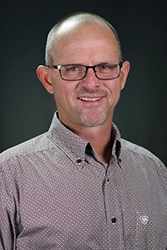
-
John Cason
- Assistant Professor
Peanut Genetics - Office:
- Stephenville
- Email:
- [email protected]
- Phone:
- 254-968-4144
Education
- Undergraduate Education
- B.S. Animal Science, Tarleton State University, 1994
- Graduate Education
- Ph.D. Plant Breeding, Texas A&M University, 2018
- M.S. Agriculture, Tarleton State University, 2002
Areas of Expertise
- Peanut Breeding and Genetics
Professional Summary
My position is located at the Texas A&M AgriLife Research and Extension Center at Stephenville. As part of my duties, I collaborate with Research and Extension scientist at the Vernon, Corpus Christi and Lubbock centers as well as with the scientists in the Soil and Crop Sciences and other Department at Texas A&M University, College Station as part of the Texas A&M peanut program. In addition, I strive to develop collaborative relationships with peanut breeders and researchers in other disciplines and other states and/or countries. I am also responsible for oversight and coordination of statewide breeding line trials, multi-disease testing, and yield testing of advanced breeding lines. In addition, I also coordinate breeder’s seed increases for new peanut cultivars and periodic re-purification of the breeding program for eventual delivery to the Texas A&M Foundation Seed Service.
A major focus of my program is to enhance germplasm of the cultivated peanut by utilizing wild and exotic relatives collected from various parts of the world. Cultivated peanut suffers from genetic bottleneck that isolates it from many beneficial biotic and abiotic resistance traits found in the wild and exotic germplasm. We maintain an extensive collection at the Stephenville REC which is one of the most diverse in the world. My predecessor, Charles E. Simpson, Ph.D., spent much of his career collecting the germplasm from around the world and has already successfully introgressed at least seven desirable Arachis traits into the cultivated peanut. I am continuing this work by applying new cutting edge genomic and phenomic techniques to the process. We are also exploring new areas of research such as phenotyping the collection for traits associated with increased human health benefits.
Building on the already established breeding and testing program, additional goals of the program are the development of a cultivars that specifically addresses the need of organic peanut producers and the development of high throughput phenotyping capabilities. It is estimated that Texas produces almost 98% of all organic peanuts in the United States. These producers face a distinct set of challenges that the Texas A&M Peanut Breeding and Wild Species Introgression program are uniquely suited to address. In addition, a long-term goal is to make our program a leader in the use of high throughput phenotyping in peanuts. The ability to collect large amounts of data quickly and accurately is changing the way that researchers are able to make breeding decisions and that is of great interest to me. Raman Spectroscopy and Unmanned Aerial Systems are two areas of particular interest that have shown great promise.
Students